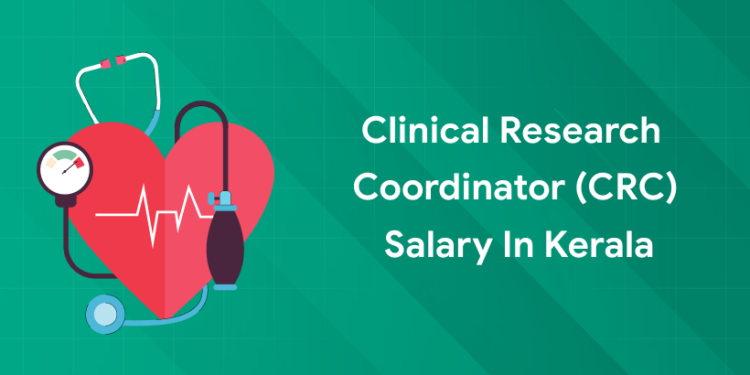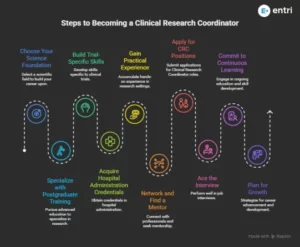Table of Contents
Key Takeaways:
- The average annual salary for CRCs in Kerala is approximately ₹4.4 lakhs, with entry-level pay starting around ₹2.5 lakhs and experienced professionals earning up to ₹6.8 lakhs yearly.
- Monthly CRC salaries in major Kerala cities typically range from ₹21,000 to ₹24,000, with top salaries reaching ₹50,000 per month for advanced positions.
- Higher education and certifications, such as master’s degrees or hospital administration training, can boost CRC salaries by up to 77%.
- The gender pay gap persists, with male CRCs earning about 9% more than females; proactive negotiation and upskilling are key to bridging this gap.
- Kerala’s healthcare sector is expanding rapidly, ensuring growing demand, frequent pay raises (8% annually on average), and strong career stability for skilled CRCs.
Introduction: Why CRCs Are in High Demand
Clinical Research Coordinators (CRCs) are the linchpins of medical research teams—making new treatments possible and ensuring patient trials run smoothly. In Kerala, rising healthcare investments and a thriving hospital ecosystem have created promising career paths for CRCs. Whether in Kochi’s bustling multispecialty hospitals or small city clinics, CRCs play an essential role in ensuring that clinical trials are ethically run and produce reliable results.
Living in Kerala, many science graduates and healthcare aspirants are discovering just how lucrative and meaningful the CRC pathway can be. Not only do these roles offer competitive salaries, but CRCs also enjoy long-term professional growth and the chance to contribute to medical progress. With Kerala’s steady push for better healthcare and growing pharmaceutical trials, CRCs now get to combine rewarding work with career stability and advancement.
What Does a Clinical Research Coordinator Do?
1: Who was the first woman President of India?
Clinical Research Coordinators (CRCs) are at the core of every successful medical trial, juggling responsibilities that go far beyond basic administration:
-
Pre-Trial Planning: Collaborate with the research team to draft protocols, prepare regulatory documents (like consent forms and case report files), submit materials for Institutional Review Board (IRB) approval, and train study staff for compliance.
-
Participant Recruitment: Identify, screen, and enroll participants. CRCs carefully assess eligibility and conduct the informed consent process, ensuring participants thoroughly understand procedures and risks before joining the study.
-
Data Collection and Management: Gather, code, and analyze research data from participants, maintain highly accurate records, and enter vital study information in secure systems. This also means managing daily study visits, uploading information, and troubleshooting data discrepancies.
-
Trial Operations: Coordinate patient schedules, procedures, specimen collection, and site logistics. Ensure every protocol is followed by the book, including Good Clinical Practice (GCP) and regulatory standards.
-
Compliance and Documentation: Track adverse events, submit regular updates to regulators, handle audits, and guarantee all work is conducted ethically. CRCs are the go-to people for addressing queries and maintaining transparency throughout the trial.
-
Communication: Act as the bridge between patients, principal investigators, hospital staff, sponsors, and regulatory bodies, keeping everyone informed and focused on patient safety and research integrity.
-
Budget and Training: Oversee trial expenses, organize resources, and sometimes train or supervise junior staff to keep the study running efficiently.
Free UPSKILLING Courses!
Take your first step toward mastering in-demand skills, acing interviews, and securing top-tier jobs with Entri's free upskilling courses.
Start Learning!Salary Table: CRC Earnings in Kerala
The table below summarizes monthly and annual average CRC salaries in major Kerala cities and by experience level.
| Category | Monthly Salary | Annual Salary | Notes |
|---|---|---|---|
| Entry-level (0–2 years) | ₹21,000–₹24,000 | ₹2.5–₹3 lakhs | Kochi & Thiruvananthapuram figures |
| National Median | ₹36,858 | ₹4.4 lakhs | |
| 2–5 years experience | ₹27,575 | ₹3.3 lakhs | 31% salary increase after 2 years |
| 5–10 years experience | ₹38,700 | ₹4.6 lakhs | |
| 10–15 years experience | ₹46,333 | ₹5.5 lakhs | |
| 15–20 years experience | ₹50,475 | ₹6.05 lakhs | |
| 20+ years experience | ₹54,350 | ₹6.5 lakhs | |
| Kochi (all roles avg.) | ₹24,279 | ₹2.9 lakhs | Average reported for CRCs |
| Thiruvananthapuram (all roles avg.) | ₹21,494 | ₹2.6 lakhs | Average reported for CRCs |
| CRC II (specialized) | ₹47,925 | ₹5.75–6.17 lakhs | Advanced CRC roles in Kochi |
CRC pay varies widely, given a mix of factors that add up over time:
-
Experience & Seniority: With every year in clinical research, CRCs earn higher pay—those managing advanced studies or specialized teams see quicker salary jumps.
-
Education: Degrees in pharmacy, medicine, or a postgraduate diploma in clinical research or hospital administration can raise median salaries by 50–77%.
-
Employer Type: Those working in private hospitals, international research organizations, or large pharmaceutical firms often receive more competitive compensation than their government sector peers.
-
Location: CRCs based in Kerala’s larger cities—or working for urban medical research hubs—generally command higher salaries than those in smaller districts.
-
Skills & Certifications: Professionals with specialized skills in biostatistics, data management, regulatory affairs, or hospital administration have leverage when negotiating for better pay.
-
Gender & Negotiation: While men currently earn about 9% more on average, proactive negotiation and upskilling help bridge this gap.
-
Performance & Growth: CRCs who assume added responsibilities (like staff management, budgeting, or cross-site coordination) are first in line for promotions and salary hikes.
Tips for CRC Salary Growth
-
Continuous Learning: Upgrade certifications—especially in clinical trial management, regulatory affairs, and hospital administration. Entri’s course is highly recommended for Kerala aspirants seeking fast-track pay hikes.
-
Build Specialized Skills: Focus on mastering data analytics, patient safety protocols, and project management—they’re valued highly and help you climb the pay ladder faster.
-
Networking: Attend workshops, seminars, and connect with professionals in the CRC ecosystem. Building relationships with sponsors, regulatory experts, and fellow researchers can open doors to top-tier job opportunities.
-
Take Initiative: Volunteer for leadership roles within clinical studies—such as budget planning, staff training, or multi-site trial coordination. These experiences distinguish CRCs in performance reviews.
-
Stay Updated: Regularly review evolving guidelines, compliance requirements, and technological advancements in clinical research. Being the “go-to” person for new processes increases your indispensability and bargaining power.
-
Effective Negotiation: Know your market worth—research salary trends and confidently negotiate your package during appraisals and job switches.
CRC Job Scope and Career Growth in Kerala
-
CRCs are critical to the success of clinical trials, working alongside doctors, nurses, statisticians, and regulatory teams.
-
Kerala’s expanding healthcare infrastructure means CRCs are needed in multispecialty hospitals, research labs, universities, and biotech companies.
-
Promotion tracks vary: CRC > Senior CRC > Clinical Project Manager > Director of Clinical Research.
-
Alternate transitions: CRCs can shift into hospital administration, medical writing, or pharmaceutical regulatory compliance.
Free UPSKILLING Courses!
Take your first step toward mastering in-demand skills, acing interviews, and securing top-tier jobs with Entri's free upskilling courses.
Start Learning!Career Advancement Tips
-
Attend workshops and webinars to stay updated on new regulations and trial methodologies.
-
Seek mentorship and network actively—hospital administration blogs, including Entri’s, offer insights on leadership and growth.
-
Keep learning—picking up skills in data analysis, patient safety, and project management pays off in faster career advancement.
How to Become a Clinical Research Coordinator
Step 1: Choose Your Science Foundation
-
Pursue a bachelor’s degree in Life Sciences, Pharmacy, Biotechnology, Medicine, or Allied Health sciences.
Step 2: Specialize with Postgraduate Training
-
Opt for a PG Diploma, Master’s in Clinical Research, or related fields—these elevate qualifications and boost job market visibility in Kerala.
Step 3: Build Trial-Specific Skills
-
Learn key areas like GCP guidelines, trial documentation, patient consent, and regulatory ethics through short courses or workshops.
Step 4: Acquire Hospital Administration Credentials
-
Hospital administration skills add management expertise and job flexibility; consider enrolling in Entri’s Hospital Administration Course for advanced training and placement support.
Step 5: Gain Practical Experience
-
Seek internships or entry-level roles in hospitals, research labs, or pharma clinics. Real-world exposure helps you master recruitment, data handling, and trial monitoring.
Step 6: Network and Find a Mentor
-
Connect with trained CRCs, participate in professional events, and seek mentors who provide guidance on study operations and career growth.
Step 7: Apply for CRC Positions
-
Prepare a strong CV highlighting education, certifications, internship experience, and organizational skills. Target Kerala’s urban hospitals, research centers, and private clinics for a wider job pool.
Step 8: Ace the Interview
-
Brush up on clinical trial protocols, ethical guidelines, and research regulations. Display confidence and a proactive approach to both technical and soft-skill questions.
Step 9: Commit to Continuous Learning
-
After landing the job, continue upskilling! Obtain advanced certifications, develop leadership skills, and keep pace with regulatory updates to grow quickly in this dynamic field.
Step 10: Plan for Growth
-
Set ambitions for higher roles—Senior CRC, Clinical Project Manager, or transition into hospital administration as you build years of experience and expertise.
Hospital Administration and CRCs: The Career Connection
Hospital administrators and CRCs both manage compliance, schedules, data, and team coordination. Advancing into hospital administration boosts your earning potential and leadership capacity.
-
Entri’s Hospital Administration Course (Kerala): Get industry-recognized management skills and real-world project training.entri+1
-
Access study resources, expert mentorship, and job-matching support.
-
CRCs with admin skills are valued for their ability to oversee large-scale projects and multidisciplinary teams.
Explore more in:
Conclusion: Unlock Your CRC Career in Kerala
If the thrill of medical discovery appeals and you value stable career growth, becoming a CRC in Kerala is a rewarding choice. Competitive salaries, rapid promotions, and the chance to lead transformative healthcare projects await those who upskill and commit to excellence. Explore Entri’s Hospital Administration program for guaranteed placement support, expert training, and the credibility needed for higher roles. Begin your journey in Kerala’s dynamic healthcare sector today—your future in clinical research coordination starts now.
| Also Read | |
| How to Become a Hospital Administrator | |
| Top Skills Needed for a Successful Career in Hospital Administration | |
| Career Pathways in Hospital and Healthcare Administration |
Free UPSKILLING Courses!
Take your first step toward mastering in-demand skills, acing interviews, and securing top-tier jobs with Entri's free upskilling courses.
Start Learning!Frequently Asked Questions
What is the entry-level CRC salary in Kerala?
Average monthly pay is ₹21,000–₹24,000; annual median is ₹4.4 lakhs.
Is professional certification necessary for CRC roles?
Yes—having a PG Diploma or certification, especially in hospital administration, can nearly double the salary opportunity
Where can CRCs work in Kerala?
Multispecialty hospitals, university research centers, pharma clinics, and government health programs.
How do hospital administration skills help CRCs?
They prepare CRCs for leadership and management; courses like Entri’s are industry-endorsed for upskilling.
Are salaries rising for CRCs in Kerala?
Yes—annual pay raises average about 8% every 12 months, with higher increases for top performers.
















